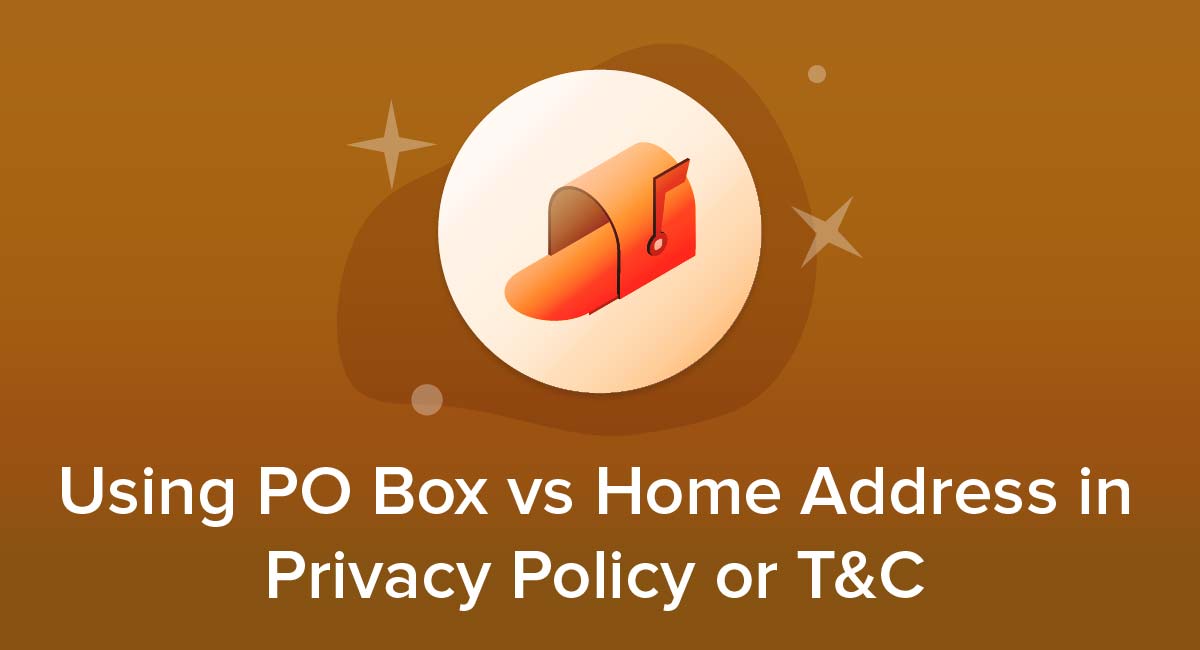
When some business owners create a Terms and Conditions agreement or Privacy Policy for their website, they often wonder if they can use a home address or PO Box instead of a business address.
But what about including an address of any kind in your website's legal documents?
We'll dig further into these questions and explain why you should skip using your home address or a PO Box and go with an official, physical business address instead.
Use FreePrivacyPolicy.com to generate the necessary legal agreements for your website/app:
- Free Privacy Policy Generator
- Free Terms and Conditions Generator
- Free Cookies Policy Generator
- Free Disclaimer Generator
- Free EULA Generator
- Free Return & Refund Policy Generator
You check our Free Cookie Consent to start making your business legally compliant with the Cookies Directive in the EU.
- 1. Do You Need an Address in Your Terms and Conditions Agreement?
- 2. Do You Need an Address in Your Privacy Policy?
- 2.1. What if Your Customers are All in the USA?
- 3. Why is Using a Home Address a Bad Idea?
- 4. What About Using a PO Box as a Business Address?
- 5. Are There Other Options Available?
- 6. What is a Virtual Business Address?
- 6.1. A Virtual Business Address Isn't Really Virtual
- 6.2. Other Services
- 7. A Real Business Address is Still Best
Do You Need an Address in Your Terms and Conditions Agreement?
The short answer is no. You can search around online until you're blue in the face, and you won't find many companies putting any kind of address for their business within their Terms and Conditions agreement.
You don't even legally need to have a Terms and Conditions agreement on your website if you don't want to. This is not a wise decision, but you're not legally bound to have one.
Most Terms and Conditions should be customized according to the needs of the business, but typically they should include the following:
- Introduction: Explain the purposes of the agreement and name your company and the customer as the parties to the agreement
- Effective date: Provide the date of the most recent version of the agreement and consider posting links to older versions
- Other Policies: Post links to separate legal documents, such as your Privacy Policy
- Changes to your terms: Clarify that you have the right to make changes to the Terms and Conditions and provide information on how you will give notification to customers
- User-generated content: Set the rules for visitors who want to contribute to your service or website
- Payments: Set the rules for refunds and billing
- Account suspension and termination: Describe the penalties for breaching the Terms and Conditions agreement, and how users can terminate accounts
- Exclusion of warranties: Exclude the implied warranties of merchantability and fitness
- Limitation of liability: Clarify the limits of the responsibility you accept for mistakes on the part of your company
- Indemnity clause: Explain that visitors to your website must cover any losses they cause your company through their own actions
- Governing law: Clarify which jurisdiction's courts will hear any disputes arising from your Terms and Conditions
As you can see, there are no conditions necessitating contact information within a Terms and Conditions agreement. However, that is not the case for a Privacy Policy.
Do You Need an Address in Your Privacy Policy?

Yes, you do need to include an address in your Privacy Policy. Many privacy laws around the world now require business owners to include an address where consumers may contact them.
For instance, The General Data Protection Regulation (GDPR) is a set of regulations that aims to protect the personal data of individuals in the European Union. Any business that collects, stores, or processes the personal data of EU citizens will be required to comply with the GDPR.
Under GDPR regulations, businesses must list the physical location where consumer data is being stored and processed.
If applicable, they must also state the name and contact details of both the data controller and any data processors.
If you do business in the EU, clearly listing a home address as the location where you store personal data would be considered problematic at best. Of course, there's no way you can keep a customer's personal data in a PO Box either!
What if Your Customers are All in the USA?
Many states within the United States are moving toward adopting privacy legislation that closely matches much of what's contained in Europe's GDPR.
For instance, CalOPPA is a California state law that applies to any company that collects personal information from California residents. This law requires companies to post a Privacy Policy on their website that includes certain information, such as what personal information is collected and how it is used.
The law also gives Californians the right to know what personal information is being collected about them and to have that information deleted.
Additionally, it requires businesses to post a clear explanation of how users can request amendments to any personal data that is collected, such as by providing an address where these requests can be sent.
Why is Using a Home Address a Bad Idea?
As stated previously, major privacy laws require business owners to list the address where they keep their customers' personal information.
In addition to your home address being a relatively insecure location to keep and maintain the personal data of your customers, using it opens you up to additional risks.
For example, posting your home address as your business address makes it public. Literally anyone could discover where you live. This can harm your privacy and personal life, and put your safety at risk.
Secondly, rules related to Lease and Homeowner Association agreements may prohibit using the home address for business purposes.
What About Using a PO Box as a Business Address?

This option suffers from some of the same drawbacks as using a home address. That's particularly true in that you can't meet the requirements of privacy laws like the GDPR if you do so.
The drawbacks don't stop there, however.
Google is the most well-known search engine worldwide, and as such, it wields a significant amount of power when it comes to ranking websites. One of the factors that Google takes into account when determining rankings is the business address listed on the website.
If a website lists a PO Box as its business address, Google will ding the website in the rankings because it views this as an indication that the business isn't entirely as legitimate as it should be.
Additionally, listing a PO Box on a website is against Google's Terms of Service agreement, which means that the website could be at risk of being suspended or removed from Google entirely.
As a result, it's generally not a good idea to use a PO Box as a business address.
Besides, some businesses have tried to exploit this system by renting PO Boxes in order to appear as if they have a physical address. Google has since updated its rules to require businesses to provide a valid street address.
Are There Other Options Available?
There are other options available, and they won't get you into trouble with privacy laws or Google.
For instance, you can always invest in opening up a physical office or place of business. Alternatively, you might consider using a virtual business address in some situations.
What is a Virtual Business Address?

A virtual business address is a real address at a mail center or office building. It's a place where you receive your business mail and packages, but it's not a PO Box.
A virtual business address relies on the Internet for meetings, document exchange, telephone answering, and video conferencing, so employees can keep in touch no matter where they're located.
If your business doesn't collect, process, or maintain the personal data of your customers, a virtual business address is a much better option than using your home address or a PO Box.
Virtual business addresses have grown in recent years as more businesses embrace virtual office solutions for a variety of reasons.
These services are available in all 50 states and multiple countries overseas, and having a virtual address can add a touch of credibility to your business. You don't need to sign any long-term leases or make any other commitments to set up a virtual address. All you need to do is choose the location you want and start using it as your business's mailing address.
Plus, virtual addresses often come with additional features like mail forwarding and package receiving.
A Virtual Business Address Isn't Really Virtual
Though it may go by a virtual name, there is nothing virtual about the business addresses offered by companies providing them.
In essence, these companies provide a physical address where your business mail will be sent and that you can use without getting dinged by Google.
A professional provider will filter your mail on your behalf, discarding any junk mail or unwanted solicitations. You can then view and manage your mail online, choosing which pieces you would like to have forwarded to you elsewhere.
As a result, virtual mail forwarding services provide the best of both worlds: The convenience of online management with the peace of mind of knowing that your business mail is being handled by a professional.
Other Services
There are a few other perks to using a company that provides virtual business addresses. In addition to filtering mail, many providers offer other services, such as call forwarding and live receptionist services. This can be a superb way to improve customer service and give your business a professional image.
Plus, you can also send business correspondence from your virtual business address through the same company. All you need do is take a photo of your document or scan it, then upload it and specify the address where you want it delivered.
A Real Business Address is Still Best
In order to protect your customers and be compliant with international privacy laws, it is important to list a physical business address in your Privacy Policy. If you do not have a brick-and-mortar location, consider using a virtual office or service that provides a business address.
A home address or PO Box should never be used as a business address, as they do not meet the requirements for compliance with most global data protection laws.
To stay compliant with global privacy laws, an actual, physical business address is a must.


